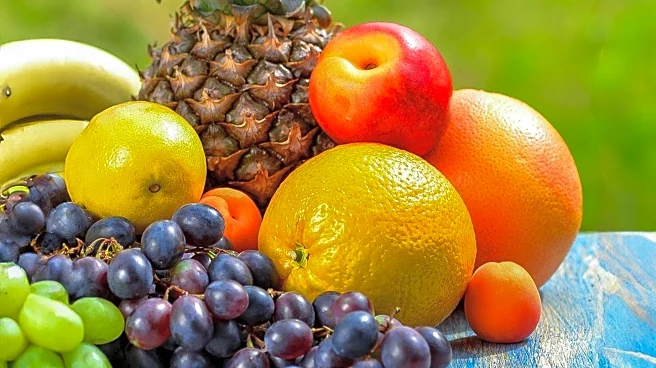What's Happening?
Health experts are emphasizing the importance of a plant-rich diet, particularly one that includes a variety of fruits, in reducing cancer risk. Fruits such as blueberries, avocados, apples, red grapes, kiwi, and tomatoes are noted for their unique nutrients and potential cancer-preventive properties. Blueberries, for instance, contain anthocyanins that may prevent DNA damage and slow cancer development. Avocados are rich in healthy fats and fiber, which support gut health and reduce inflammation. Apples offer phenolic compounds with anti-inflammatory and antioxidant effects, while red grapes contain polyphenols that may slow cancer cell growth. Kiwi provides vitamin C, an antioxidant that protects the gastrointestinal lining, and tomatoes contain lycopene, which may regulate cell growth. These fruits are recommended as part of a balanced diet to help lower cancer risk.
Why It's Important?
The significance of this dietary advice lies in its potential impact on public health, particularly in the United States, where cancer is a prevalent concern. With half of all men and one in three women expected to be diagnosed with cancer in their lifetime, incorporating cancer-preventive foods into daily diets could play a crucial role in reducing these statistics. The emphasis on natural sugars found in fruits, as opposed to added sugars, highlights the nutritional benefits without the drawbacks of high-calorie intake. By promoting a diverse intake of fruits, individuals can enhance their nutrient diversity, potentially leading to better health outcomes and reduced cancer risk. This approach aligns with broader public health strategies aimed at encouraging healthier eating habits and lifestyle changes.
What's Next?
Further research is needed to solidify the understanding of how these fruits contribute to cancer prevention. Health experts may continue to study the specific compounds in these fruits to better understand their mechanisms in cancer risk reduction. Additionally, public health campaigns could focus on educating the population about the benefits of a plant-rich diet and how to incorporate these fruits into daily meals. As more evidence emerges, dietary guidelines may be updated to reflect these findings, potentially influencing food industry practices and consumer choices.
Beyond the Headlines
The emphasis on fruits in cancer prevention also touches on broader issues such as food accessibility and dietary education. Ensuring that diverse and nutrient-rich fruits are available and affordable to all segments of the population is crucial for widespread adoption of these dietary recommendations. Moreover, cultural preferences and dietary habits may influence how these fruits are integrated into meals, highlighting the need for culturally sensitive health education programs.








